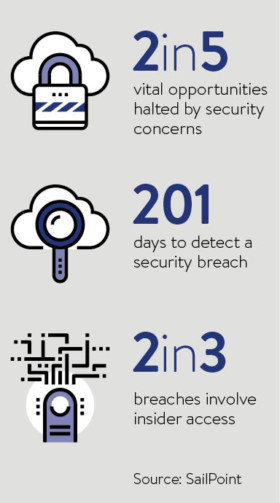The world today is more advanced and interconnected than ever, creating lucrative opportunities for businesses. But it is far easier to gain information and access through these new channels, so the advances come at a cost. Businesses have had to secure their prized and sensitive information against cyber attacks to keep afloat.
The consequences of not protecting sensitive information, no matter where it “lives” within an organisation, are catastrophic. This fear can create a state of business paralysis, which displaces innovative drive and forces companies to forego competitive advantage to stay safe.
While the opportunities in this new business reality are endless and hugely lucrative, further integration between the physical and digital worlds comes at a time when the cyber-threat landscape is becoming an increasingly critical issue for organisations, large and small, around the world.
 Protecting identity
Protecting identity
Too many organisations aren’t taking cyber crime as seriously as they should. Access to insightful information can create business value, but companies also need to protect sensitive data from hackers.
Many of the cyber attacks that have received the most press attention recently were down to people’s identities being taken. These people were mainly inside the organisation with access to too much information.
Organisations require an identity and access management strategy that doesn’t allow security to inhibit growth.
The security problems facing businesses certainly can’t be attributed to a lack of investment in protective technology. What businesses are failing to invest in, however, is educating their employees to be more security savvy when accessing sensitive information. Humans are the biggest vulnerabilities of all.
Meanwhile, most organisations allow their business users, spanning employees, contractors, vendors and partners, to access far more corporate systems than they require to do their job.
With all the applications and users, enterprises could easily have a billion points of access, and it is quicker and easier to fool a person than it is to penetrate a network. Identity is becoming the attack vector of choice for hackers.
Organisations require an identity and access management strategy that doesn’t allow security to inhibit growth
Organisations that can set up business users to access only the right information at the right time, with the ability to change what they can access immediately, can focus on innovation and driving value from new streams of data without worrying about who’s getting their hands on it.
Any business that can do this already has the majority of its security issues dealt with. Organisations need to understand what data they have, what data is critical, who has access to it, and then make sure they limit access to people who should have access to it.
Fearless innovation
To make matters more complicated, new regulations are emerging that are adding to the fear that organisations already face when it comes to protecting sensitive data. They now need to prove it. For example, the General Data Protection Regulation will come into force in 2018, unifying data protection laws across the European Union’s member states. The new law will hold organisations fully accountable for implementing a comprehensive data governance policy.
With non-compliance and data breaches set to result in fines of up to 4 per cent of a company’s total global annual turnover, IT security and identity management must become a greater focus for all companies with data that relates to EU citizens or passes through EU countries.
Identity management not only enhances a company’s ability to comply with data regulations, but also helps them strategise and innovate without the looming fear of data breaches. The advanced visibility over user access allows companies to detect and mitigate a data breach, and ultimately focus on their business priorities.
Many companies are still focused on parameter security, trying to stop people getting into their physical infrastructure. The world has moved on. Companies shouldn’t care if somebody accesses their corporate infrastructure – they need to make sure nobody can access sensitive data.
For more information please visit www.sailpoint.com




